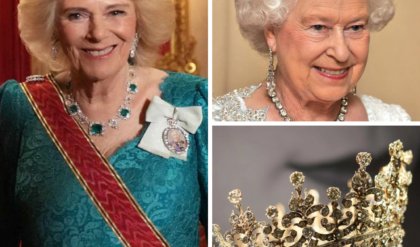In a fiery exchange that has reignited tensions between the Trump administration and its critics, White House Press Secretary Karoline Leavitt has delivered a sharp rebuttal to Representative Jasmine Crockett’s recent dismissal of President Donald Trump’s military parade as a failure. The clash, sparked during a White House press briefing on June 19, 2025, has fueled a heated online debate, with Leavitt defending the event’s significance and Crockett doubling down on her critique. This confrontation, set against the backdrop of Trump’s polarizing leadership style and Crockett’s rising profile as a Democratic firebrand, has captivated political observers and social media users alike. Here’s a detailed look at what transpired, the context behind the dispute, and the broader implications for American political discourse.
The Incident: A Parade Sparks a Showdown
The controversy erupted during a White House press briefing when a reporter raised Crockett’s comments about the military parade held on June 14, 2025, to mark the U.S. Army’s 250th anniversary and coincide with Trump’s 79th birthday. The event, featuring tanks, military bands, and a flyover along Constitution Avenue, was billed by the administration as a celebration of American strength. However, Crockett, a Texas Democrat, appeared on Katie Couric’s Next Question podcast and labeled it a “flop,” arguing that the turnout was underwhelming and the spectacle reflected Trump’s self-aggrandizement rather than national pride. She quipped, “This parade was less about the Army and more about Trump polishing his ego—hardly a success when half the country tuned out.”
Leavitt’s response was swift and unapologetic. Addressing the question during the briefing, she said, “Representative Crockett’s take is laughable. The parade honored our troops and drew thousands to celebrate American resilience. If she thinks it’s a failure, maybe she should check the footage—or better yet, show up next time.” The press room buzzed with murmurs, and Leavitt’s pointed delivery, punctuated by a smirk, set the tone for what would become a viral moment. Crockett later fired back on X, calling Leavitt’s defense “delusional” and accusing the administration of misrepresenting the event’s reception.
Eyewitnesses noted the exchange’s intensity, with one reporter describing it as “a rare moment where the briefing felt like a live debate.” The confrontation was broadcast live, and clips quickly spread across platforms, amassing millions of views within hours. Hashtags like #LeavittVsCrockett and #ParadeFail trended, reflecting the polarized reactions that followed.
The Viral Storm: Public Reaction Explodes
Social media became the battleground for this dispute. Posts on X hailed Leavitt’s comeback as a “masterclass in shutting down nonsense,” with supporters praising her loyalty to Trump’s vision. One user wrote, “Karoline Leavitt just owned Jasmine Crockett—time for Dems to face reality.” Conversely, Crockett’s allies defended her stance, with comments like “Crockett’s right—Trump’s parade was a vanity project, not a victory.” The divide mirrored broader political fault lines, with Trump’s base celebrating the event as a patriotic triumph and critics decrying it as a misstep.
The parade itself had drawn mixed reviews. Official estimates claimed over 200,000 attendees, though independent counts suggested a lower figure, closer to 50,000. Counter-demonstrations by the “No Kings” movement, protesting Trump’s policies, drew significant crowds in cities like Philadelphia and Los Angeles, adding to the narrative of division. Crockett’s claim of failure hinged on this contrast, while Leavitt emphasized the event’s military focus and the administration’s intent to inspire unity.
The Context: Leavitt’s Ascendancy and Crockett’s Rise
Karoline Leavitt, at 27, has emerged as a formidable voice in the Trump administration since her appointment as press secretary in January 2025. The youngest to hold the role in U.S. history, she brings a combative style honed during her time as a Trump campaign spokesperson and her unsuccessful 2022 congressional run in New Hampshire. Her tenure has been marked by sharp exchanges, including a recent clash with NBC’s Yamiche Alcindor, establishing her as a key defender of Trump’s agenda. Leavitt’s background—rooted in a working-class New Hampshire family and shaped by her Catholic education—resonates with the administration’s “America First” rhetoric.
Jasmine Crockett, a 43-year-old Dallas representative, has quickly risen as a leading Democratic voice against Trump. Elected in 2022, she gained national attention during the 2023 House Oversight Committee hearing with her fiery rebuke of Republican Marjorie Taylor Greene. Her podcast appearance showcased her willingness to challenge Trump directly, aligning with her reputation as a progressive firebrand. Crockett’s critique of the parade tapped into Democratic frustrations with Trump’s leadership style, particularly his use of military imagery, which she has previously called “authoritarian.”
The Parade Debate: Success or Spectacle?
The June 14 parade was a signature Trump event, blending military pomp with political messaging. Held in Washington, D.C., it featured a procession of armored vehicles, a 21-gun salute, and a speech from Trump praising the Army’s legacy. The administration touted it as a morale booster amid global tensions, including recent U.S. military actions in the Middle East. However, critics like Crockett pointed to logistical issues—traffic disruptions, limited public access, and competing protests—as evidence of poor planning. Attendance figures remain disputed, with the White House citing enthusiastic crowds and opponents highlighting empty seats in broadcast footage.
Leavitt’s defense leaned on the event’s symbolic value, arguing it honored veterans and showcased American might. She dismissed Crockett’s assessment as politically motivated, suggesting the congresswoman misunderstood the parade’s purpose. Crockett, in turn, doubled down, citing social media posts from attendees complaining about organization and security, framing it as a metaphor for Trump’s broader governance.
The Bigger Picture: Politics and Perception
This clash reflects a deeper struggle over narrative control in a polarized America. The Trump administration has consistently used high-profile events to project strength, often clashing with media and political opponents who question their intent. Leavitt’s aggressive response aligns with this strategy, using the briefing room as a platform to counter criticism head-on. Crockett’s attack, meanwhile, taps into Democratic efforts to undermine Trump’s image, especially as his administration navigates its first six months amid protests over immigration and tariffs.
The incident also highlights the role of social media in shaping public perception. Leavitt’s quick pivot to X to amplify her rebuttal mirrors Trump’s own communication style, while Crockett’s retort leveraged her growing online following. This digital duel underscores a shift where traditional press briefings are overshadowed by real-time public battles, amplifying the stakes for both figures.
The Ripple Effect: Political and Cultural Impact
The exchange has had tangible consequences. Leavitt’s profile has surged among Trump supporters, with allies like Steve Bannon praising her as “the future of the GOP.” The White House has leaned into the moment, with Leavitt’s briefings drawing increased viewership. Crockett, however, has gained traction among progressives, with calls for her to challenge Trump more directly in future debates.
Politically, the incident has fueled speculation about the 2026 midterms, with Crockett positioning herself as a potential Democratic leader and Leavitt solidifying her role in Trump’s orbit. Cultural commentators note a growing divide, with the parade debate symbolizing broader disagreements over patriotism and leadership. Charities supporting veterans reported a spike in donations, possibly linked to the event’s publicity, though it’s unclear if this reflects support or sympathy.
Conclusion: A Battle of Wills
The showdown between Karoline Leavitt and Jasmine Crockett over Trump’s parade is more than a fleeting spat—it’s a microcosm of America’s political divide in 2025. Leavitt’s fiery defense silenced critics in the moment but opened a louder conversation about the administration’s priorities. Crockett’s critique, while bold, risks alienating moderates but energizes her base. Together, they embody a clash of generations and ideologies, with the parade as the unlikely stage.
As the internet continues to dissect every word, the silence that followed Leavitt’s rebuttal may prove fleeting. For the White House, it’s a win in the narrative war; for Crockett, a chance to rally opposition. For the public, it’s a reminder that in today’s politics, every event—parade or press briefing—becomes a battleground for the soul of the nation.





